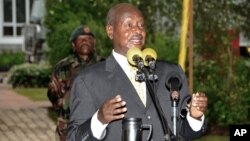Uganda's President Yoweri Museveni, facing donor aid cuts over graft, on Thursday accused unnamed "foreign interests" of sabotaging the oil sector to prevent the country from attaining financial freedom.
Uganda struck commercial hydrocarbon deposits in the Albertine rift basin along its border with the Democratic Republic of Congo in 2006 and reserves are estimated at 3.5 billion barrels.
Parliament last week passed a law granting the president power to negotiate, grant and revoke oil licences without parliamentary oversight.
The vote should help clear the way for a new licensing round for exploration blocks, which has been held up by a standoff between parliament and ministers over this and two other pending oil bills.
However, it was criticised by Western oil transparency watchdogs and some legislators for giving too much power to the executive and potentially opening up avenues for corruption.
"Those who are desperately opposing this (law) are being financed by foreign interests who have a cause," Museveni told parliament in the east African country.
"The saboteurs working on behalf of foreign interests do not want our petroleum programme to succeed because it will lead to financial independence and financial muscle."
All major Western donors froze aid to the country of 33 million people after a report by the auditor general showed about $13 million in donor funds had been embezzled by officials in the prime minister's office.
The oil law is one of long-delayed three pieces of legislation aimed at guaranteeing transparency, providing a clear management structure and instituting environmental safety mechanisms in the oil sector.
Museveni said those opposed to his control of the oil sector were trying to use local agents to protect their interests after his government rejected what he called one of their "schemes".
"Recently one of the oil companies in their first field development plan proposed that they recover only 7 percent (crude)," he said, adding that the government had rejected the proposal.
He said a recovery rate of 7 percent was unacceptable because it was way below the industry's highest rate of 60 percent.
A senior Ministry of Energy official previously told Reuters the government was looking for a crude recovery rate of about 30 percent.
Total, Tullow Oil and China's Cnooc, the three leading oil explorers in the country, are awaiting government approval of their field development plans.
French oil major Total, which is one of the firms with assets in Uganda, says crude production is likely to commence in 2017 at the earliest.





